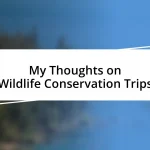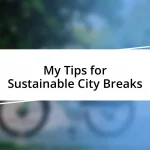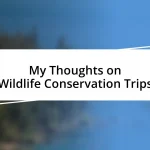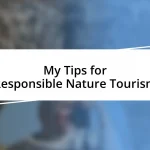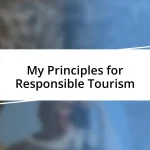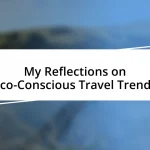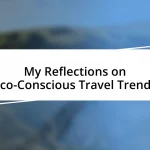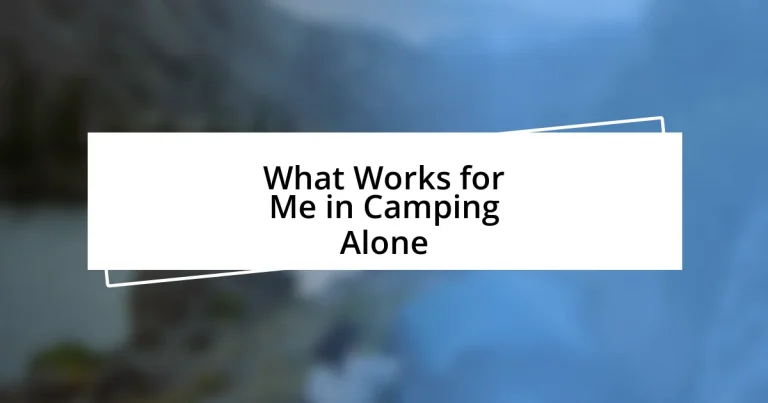Key takeaways:
- Thoroughly plan your solo camping trip by creating a checklist, researching campsites, and considering weather conditions to enhance safety and enjoyment.
- Choose the right campsite focusing on noise level, accessibility, and nearby amenities to ensure a comfortable solo experience.
- Embrace solitude in nature as an opportunity for introspection and personal growth, allowing moments of reflection to deepen your connection with yourself and the environment.
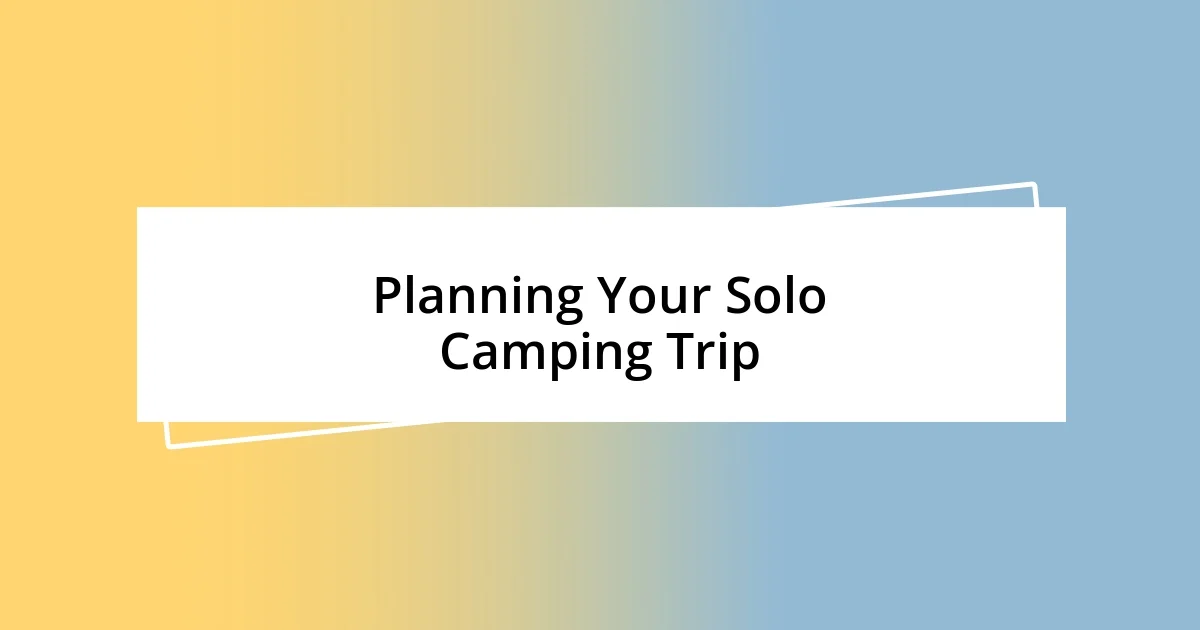
Planning Your Solo Camping Trip
When I first decided to go camping alone, the thrill of independence was matched only by my anxiety about planning. I remember pacing around my living room, wondering what essentials I would need. It’s crucial to create a checklist tailored to your destination, which not only helps avoid overpacking but also instills confidence in your planning process.
Researching your campsite in advance can make a world of difference. I once stumbled upon a hidden gem of a site thanks to an online forum where fellow campers shared their experiences. Their insights about little-known paths and nearby water sources turned my trip into an unforgettable adventure. How do you ensure your choice of location suits your comfort level? This is your chance to select a place that feels safe yet adventurous at the same time.
Lastly, think about the time of year—weather can make or break your solo adventure. I still recall a summer trip I planned during a heatwave; while I thrived in the sun, the heat led to unexpected challenges. It’s important to check forecasts and consider your own tolerance for various conditions, as this will help you prepare adequately and enjoy your time in nature without worrying about unforeseen elements. Remember, planning is key to ensuring your solo camping experience is not just safe, but truly rewarding.

Choosing the Right Campsite
Choosing the right campsite can make all the difference for a solo camping experience. I remember my first solo trip where I mistakenly chose a crowded site; it was a loud, bustling place. I quickly realized that solitude was what I craved, and finding a quieter, more secluded spot changed the entire vibe of my adventure. There’s something magical about sitting alone by a serene lake, surrounded by mountains, reflecting on life.
When considering a campsite, think about accessibility and terrain. I once chose a beautifully scenic area, but accessing it meant hiking down a steep trail with my loaded backpack. While the views were stunning, the journey tested my stamina and nerves. Ensuring that your chosen site is both reachable and comfortable for you is essential, especially when you’re alone and have to set up camp by yourself.
Lastly, consider the amenities you might need nearby. I once camped at a location without any water source, and trust me, it was quite the learning experience. At first, I enjoyed the isolation, but soon enough, the lack of basic resources became a struggle. I now prioritize sites that offer easy access to water and bathroom facilities, as it dramatically enhances my camping experience. Each of these factors plays a crucial role in crafting a successful solo camping trip.
| Factor | Consideration |
|---|---|
| Noise Level | Look for secluded areas for solitude |
| Accessibility | Ensure ease of access suitable for your equipment |
| Amenities | Choose sites with sufficient resources nearby |
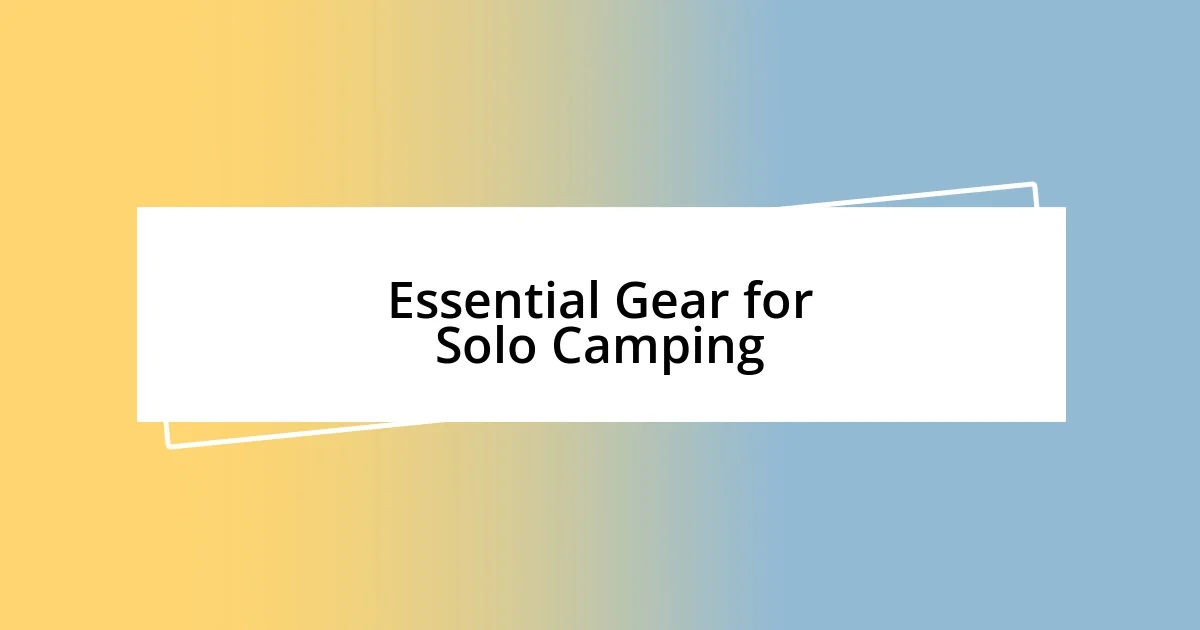
Essential Gear for Solo Camping
When I set out for my first solo camping trip, I quickly learned the importance of packing the right gear. It’s surprising how much the right equipment can influence your comfort and safety. I’ll never forget the sense of relief I felt the first time I used a compact camping stove; it transformed my meals from mundane to enjoyable. Simple pleasures like a warm meal at the end of a long day in the wilderness can elevate the entire experience.
Here’s a list of essential gear that makes outdoor solitude much more manageable:
- Tent: A reliable, easy-to-set-up shelter that fits your needs.
- Sleeping bag: Choose one that’s temperature-rated for the season you’re camping in.
- Camping stove: Compact options can really enhance your cooking experience.
- Water filtration system or purification tablets: Staying hydrated is crucial, especially when you’re alone.
- First aid kit: Always vital, but having it tailored to your specific needs is even better.
- Multi-tool: This handy gadget can be a lifesaver for various tasks.
- Headlamp or flashlight: Nighttime tasks become easier and safer with proper lighting.
- Firestarter or waterproof matches: Essential for warmth and cooking; I can’t stress this enough.
Creating a balance between what you need and what you can carry is vital to enjoying your time. I remember one trip where I overpacked, lugging around items that didn’t serve me. It quickly turned from an adventure to a chore, as the weight of my gear dampened my spirit. Understand what essentials are truly indispensable for your solo journey, and you’ll find yourself more at ease, soaking in the beauty around you.
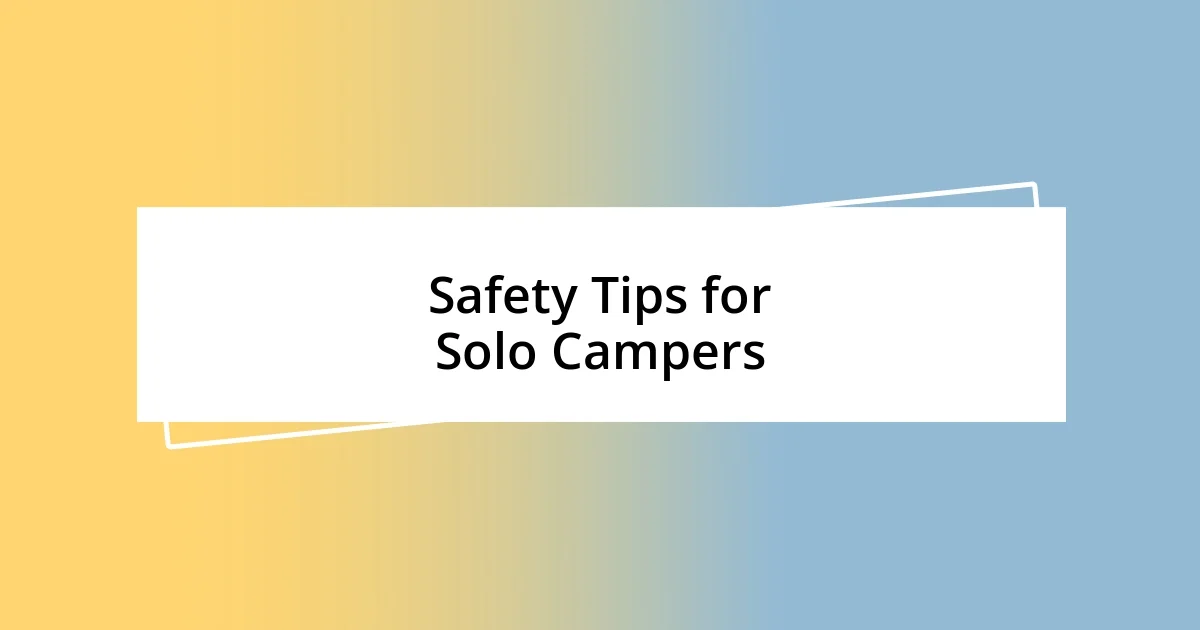
Safety Tips for Solo Campers
Safety Tips for Solo Campers
When camping alone, staying aware of your surroundings is key. On one of my trips, I noticed how the subtle sounds of nature—rustling leaves, distant animal calls—alerted me to changes around me. I always recommend taking the time to sit quietly and absorb the environment upon arrival, as it helps sharpen your senses and makes you feel more connected to nature while also keeping you safe.
Having a communication plan is another essential safety tip. I once encountered an unexpected storm while camping in a remote area and felt a wave of anxiety when my phone had no signal. Since that experience, I always share my itinerary with a friend or family member, ensuring they know where I plan to be and when. It acts as a safety net, giving you peace of mind while you enjoy your solitude in nature.
Lastly, trust your instincts. I recall a time when I was hesitant about setting up camp in a shady area, even though it seemed perfect for shade. My gut told me it might not be the safest spot due to the potential for falling branches. I moved a little further down to a more open area, and while it meant less cover from the sun, the security I felt was worth it. Learning to listen to that inner voice is an invaluable part of safe solo camping.
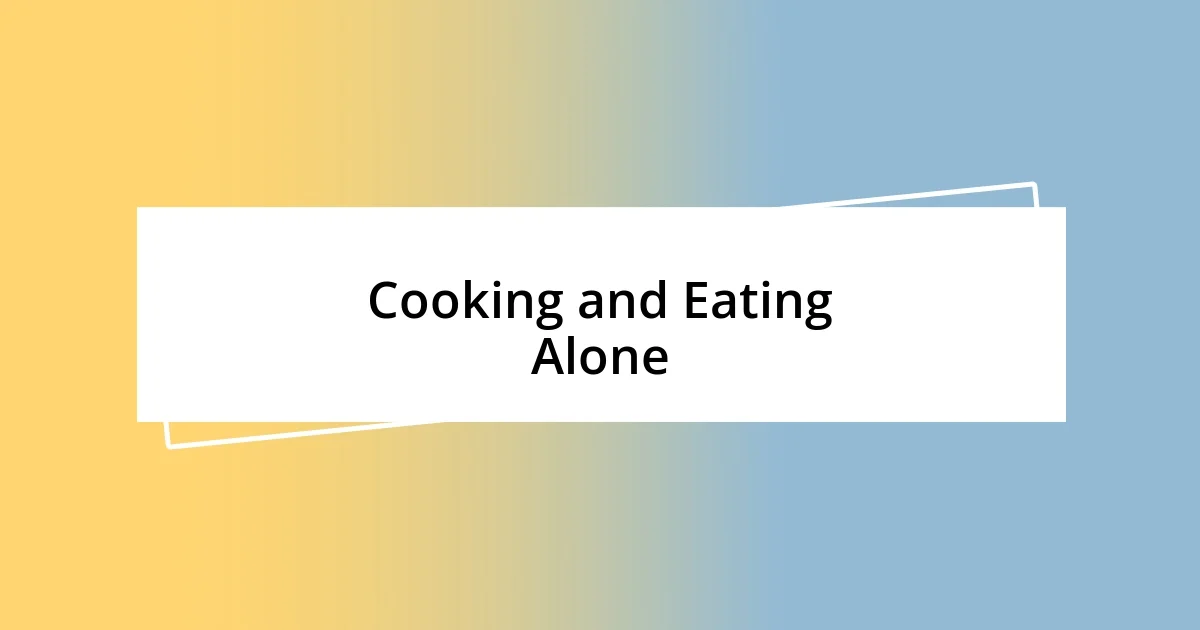
Cooking and Eating Alone
Cooking alone in the great outdoors has a unique satisfaction to it. I remember setting up my camp after a long hike, feeling the hunger pangs kick in. Using my compact camping stove, I whipped up a simple pasta dish with fresh veggies I’d packed. The aroma wafting through the trees made me feel proud and connected to my food in a way I hadn’t experienced in my busy everyday life. It’s amazing how cooking for yourself can feel like a small celebration, even when you’re surrounded by silence.
One thing I’ve learned is the importance of simplicity when it comes to meal prep while camping alone. I usually place a premium on one-pot meals because they save time and cleanup effort. For instance, I’ve made a delightful chili using canned beans, tomatoes, and spices all thrown in together. This approach not only minimizes the hassle but also allows me to relax and savor every bite as the sun sets. Have you ever noticed how a meal that requires no fuss can turn into a comforting ritual in the wild? It’s something I look forward to each trip.
As for dining, I appreciate finding a scenic spot to enjoy my meal. On one memorable evening, I sat on a rock by a lake, with a stunning view mirrored in the water. The peacefulness of that moment was amplified as I took bites of my food, listening to the rhythmic sounds of nature. I often ask myself how many people get to experience such tranquility while eating. It’s moments like these that reinforce the joy of solo camping and cooking—making every meal an experience worth savoring.
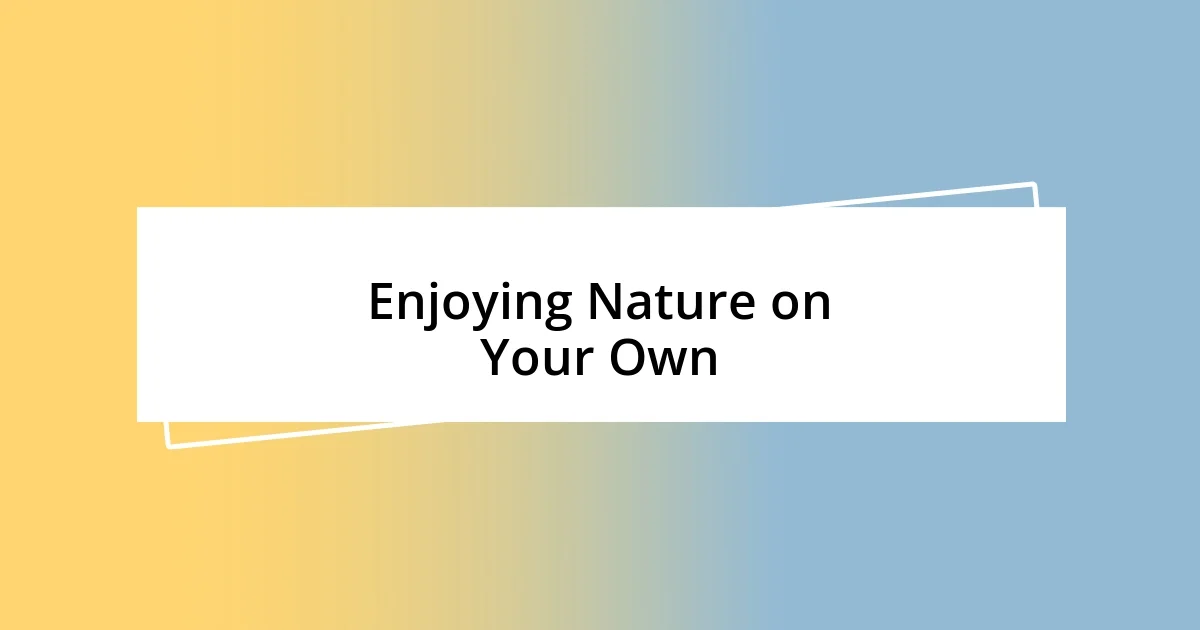
Enjoying Nature on Your Own
Being out in nature alone is profoundly healing for me. I remember once sitting on a fallen log, surrounded by towering pines, and feeling completely enveloped by the serenity around me. The gentle breeze rustled through the trees, almost whispering secrets that only I could hear. Isn’t it incredible how solitude can amplify the beauty of the natural world? I find that those quiet moments, when I’m fully present, remind me of the simple wonders that often slip by unnoticed in daily life.
I also take joy in observing wildlife while camping solo. There was an enchanting evening when a family of deer wandered into my camp. I held my breath, captivated by their grace and curiosity. There’s something unique about experiencing these moments without the distractions of company. I often ask myself: how often do we really take the time to appreciate nature when we’re surrounded by friends? These encounters with wildlife serve as a gentle reminder of the interconnectedness of all living things.
In my solo adventures, I’ve learned that enjoying nature is more than just witnessing its beauty; it’s about embracing the stillness and allowing it to resonate within me. One lazy afternoon, I laid back on my sleeping pad, gazing at the sky as fluffy clouds drifted by. I felt a sense of belonging that surprised me. Alone in the wilderness, I was reminded that I am just a small part of this vast world. Doesn’t that realization bring a sense of peace and fulfillment? Each camping trip reinforces my love for the great outdoors, leaving me with lasting memories that go beyond just the sights—it’s the feelings and connections that linger.
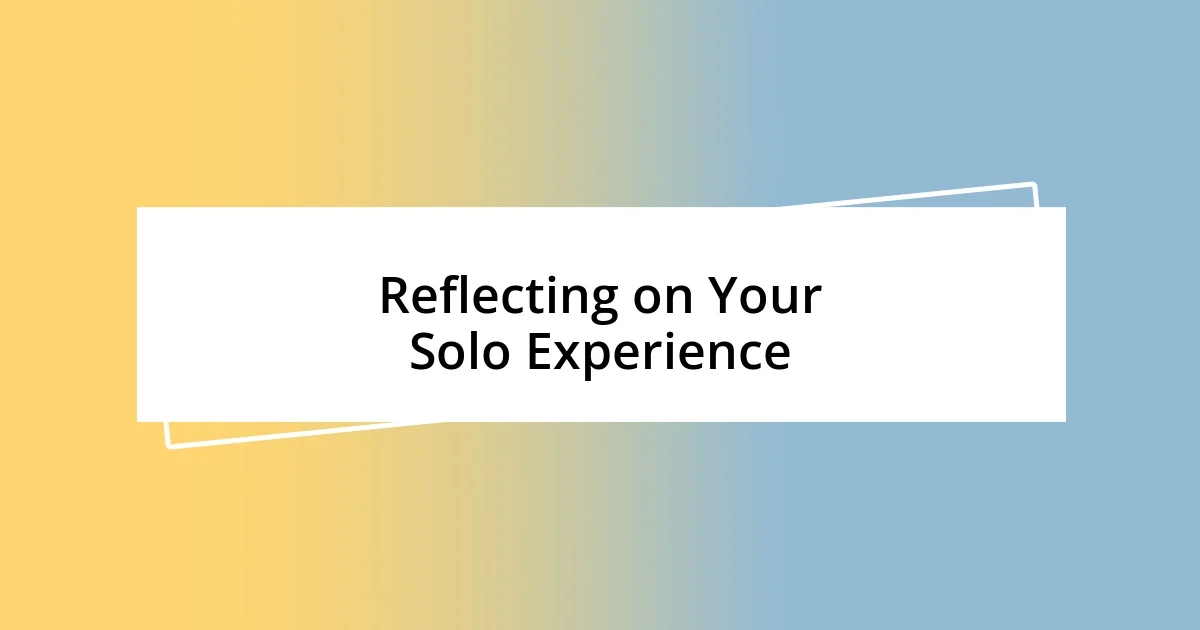
Reflecting on Your Solo Experience
Reflecting on my solo experiences while camping often reveals layers of personal growth and self-discovery. I distinctly recall one night, sitting around the crackling campfire, watching the flames dance, and I found myself pondering the choices I’ve made in life. Isn’t it fascinating how nature can provide such a backdrop for introspection? That evening, I realized that solitude doesn’t equate to loneliness; rather, it opens up a space for deeper connection with oneself.
Another time, I took a short hike after setting up camp, intentionally leaving my phone behind. Every step I took made me more aware of my surroundings—the vibrant colors of the wildflowers and the sounds of the forest. By the end of that walk, I felt rejuvenated and more attuned to my thoughts. Have you ever noticed how stepping away from distractions can unlock creativity? In those moments, reflection becomes almost effortless, allowing insights to flow freely.
These solitary moments have taught me that vulnerability often leads to powerful revelations. On one particularly misty morning, I sat at the water’s edge, contemplating my plans for the future. The fog mirrored my uncertainty but, strangely enough, I found comfort in that ambiguity. Isn’t it incredible how accepting our vulnerabilities can lead to clarity? Each solo trip not only deepens my appreciation for the wilderness but also helps me engage with my inner self in a way that’s both challenging and rewarding.

